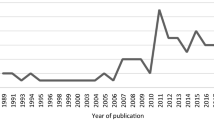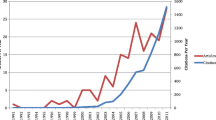Abstract
This article applies social identity theory to examine how identification with social groups shapes the entrepreneurial endeavours of individuals aged 50 or over who start businesses when unemployed or under threat of redundancy. Understanding what drives older individuals to start a business as an alternative to unemployment has important policy implications: governments are interested in promoting self-employment to reduce benefits dependence among older individuals for whom finding employment in the traditional labour market can be difficult. Our exploratory analysis is based on data collected in 21 personal interviews with senior entrepreneurs in the UK who received support from an organisation dedicated to foster enterprising activity among older unemployed people. Our findings suggest that income levels beyond making ends meet is not an important motive for starting a business among this demographic group. Instead, our data highlight the relevance of non-monetary self-rewards—such as pursuit of autonomy, self-realisation, and wanting to feel active, useful and valuable—for senior entrepreneurs who start businesses under adverse conditions. This finding resonates with the European Commission’s policy of promoting ‘active ageing’. Our analysis indicates non-monetary objectives should be included in any conceptualisation of self-interest in an entrepreneurial context.
Similar content being viewed by others
References
Abrams D, Hogg MA (1990) Social identity theory: constructive and critical advance. Springer, New York
Ainsworth S, Hardy C (2008) The enterprising self: an unsuitable job for an older worker. Organization 15:389–405
Alsos GA, Clausen TH, Hytti U, Solvoll S (2016) Entrepreneurs’ social identity and the preference of causal and effectual behaviours in start-up processes. Entrep Reg Dev 28:234–258
Berbegal-Mirabent J, Mas-Machuca M, Guix P (2019) Impact of mission statement components on social enterprises’ performance. Rev Manag Sci. https://doi.org/10.1007/s11846-019-00355-2
Blanka C (2019) An individual-level perspective on intrapreneurship: a review and ways forward. Rev Manag Sci 13:919–961
Bolton SC (2007) Dignity in and at work: why it matters. Routledge, London
Bosma N, Kelley D (2018) Global entrepreneurship monitor 2018/2019 report. https://www.gemconsortium.org/report/50213. Accessed 18 Aug 2019
Brewer MB, Gardner W (1996) Who is this ‘we’? Levels of collective identity and self representations. J Pers Soc Psychol 71:83–93
Caliendo M, Kritikos AS (2010) Start-ups by the unemployed: characteristics, survival and direct employment effects. Small Bus Econ 35:71–92
Caliendo M, Hogenacker J, Künn S, Wießner F (2015) Subsidized start-ups out of unemployment: a comparison to regular business start-ups. Small Bus Econ 45:165–190
Carlsson M, Eriksson S (2019) Age discrimination in hiring decisions: evidence from a field experiment in the labor market. Labour Econ 59:173–183
Corbin J, Strauss A (2014) Basics of qualitative research: techniques and procedures for developing grounded theory, 4th edn. Sage, Thousand Oaks
Curran J, Blackburn RA (2001) Older people and the enterprise society: age and self-employment propensities. Work Employ Soc 15:889–902
de Kok J, Ichou A, Verheul I (2010) New firm performance: does the age of founders affect employment creation. EIM Research Reports, Zoetermeer
Douglas EJ, Shepherd DA (2000) Entrepreneurship as a utility-maximizing response. J Bus Ventur 15:231–252
Engelhardt H (2012) Late careers in Europe: effects of individual and institutional factors. Eur Sociol Rev 28:550–563
European Commission (2019) Active ageing. https://ec.europa.eu/social/main.jsp?catId=1062&langId=en. Accessed 2 May 2020
Fauchart E, Gruber M (2011) Darwinians, communitarians, and missionaries: the role of founder identity in entrepreneurship. Acad Manag J 54:935–957
Ferreira JJM, Fernandes CI, Kraus S (2019) Entrepreneurship research: mapping intellectual structures and research trends. Rev Manag Sci 13:181–205
Figueiredo E, Paiva T (2019) Senior entrepreneurship and qualified senior unemployment: the case of the Portuguese Northern region. J Small Bus Enterp Dev 26:342–362
Gioia DA (1998) From individual to organizational identity. In: Whetten AD, Godfrey PC (eds) Identity in organizations: building theory through conversations. Sage, Thousand Oaks, pp 17–32
Gioia DA, Corley KG, Hamilton AL (2013) Seeking qualitative rigor in inductive research: notes on the Gioia methodology. Organ Res Methods 16:15–31
Greco AJ, Swayne LE (1992) Sales response of elderly consumers to point-of-purchase advertising. J Advert Res 32:43–53
Grover SL (2014) Unraveling respect in organization studies. Hum Relat 67:27–51
Gruber M, MacMillan IC (2017) Entrepreneurial behaviour: a reconceptualization and extension based on identity theory. Strateg Entrep J 11:271–286
Harb C, Smith PB (2008) Self-construals across cultures. Beyond independence-interdependence. J Cross Cult Psychol 39:178–197
Harms R, Luck F, Kraus S, Walsh S (2014) On the motivational drivers of gray entrepreneurship: an exploratory study. Technol Forecast Soc Change 89:358–365
Harris K, Krygsman S, Waschenko J, Rudman DL (2018) Ageism and the older worker: a scoping review. Gerontologist 58:e1–e14
Hatak I, Harms R, Fink M (2015) Age, job identification, and entrepreneurial intention. J Manag Psychol 30:38–53
Hodson R (2001) Dignity at work. Cambridge University Press, Cambridge
Hogg MA (2001) A social identity theory of leadership. Personal Soc Psychol Rev 5:184–200
Hogg MA, Smith JR (2007) Attitudes in social context: a social identity perspective. Eur Rev Soc Psychol 18:89–131
Hogg MA, Terry DJ, White KM (1995) A tale of two theories: a critical comparison of identity theory with social identity theory. Soc Psychol Q 58:255–269
Hogg MA, van Knippenberg D, Rast DE III (2012) The social identity theory of leadership: theoretical origins, research findings, and conceptual developments. Eur Rev Soc Psychol 23:258–304
Hyde M, Wiggins RD, Higgs P, Blane DB (2003) A measure of quality of life in early old age: the theory, development and properties of a needs satisfaction model (CASP-19). Aging Ment Health 7:186–194
Jayawarna D, Rouse J, Kitching J (2013) Entrepreneur motivations and life course. Int Small Bus J 31:34–56
Jennings JE, Edwards T, Jennings PD, Delbridge R (2015) Emotional arousal and entrepreneurial outcomes: combining qualitative methods to elaborate theory. J Bus Ventur 30:113–130
Kautonen T, Minniti M (2014) ‘Fifty is the new thirty’: ageing well and start-up activities. Appl Econ Lett 21:1161–1164
Kautonen T, Down S, South L (2008) Enterprise support for older entrepreneurs: the case of PRIME in the UK. Int J Entrep Behav Res 14:85–101
Kautonen T, Down S, Minniti M (2014) Ageing and entrepreneurial preferences. Small Bus Econ 42:579–594
Kautonen T, Kibler E, Minniti M (2017) Late-career entrepreneurship, income and quality of life. J Bus Ventur 32:318–333
Kibler E, Wainwright T, Kautonen T, Blackburn R (2015) Can social exclusion against “older entrepreneurs” be managed? J Small Bus Manag 53:193–208
Kraus S, Filser M, O’Dwyer M, Shaw E (2014) Social entrepreneurship: an exploratory citation analysis. RMS 8:275–292
Kulik CT, Ryan S, Harper S, George G (2014) Aging populations and management. Acad Manag J 57:929–936
Lang R, Fink M, Kibler E (2014) Understanding place-based entrepreneurship in rural Central Europe: a comparative institutional analysis. Int Small Bus J 32:204–227
Lee TW, Mitchell TR, Sablynski CJ (1999) Qualitative research in organizational and vocational psychology, 1979–1999. J Vocat Behav 55:161–187
Lévesque M, Minniti M (2006) The effect of aging on entrepreneurial behavior. J Bus Ventur 21:177–194
Lin C-P (2019) Modeling corporate citizenship and turnover intention: social identity and expectancy theories. Rev Manag Sci 13:823–840
Lucas K (2015) Workplace dignity: communicating inherent, earned, and remediated dignity. J Manag Stud 52:621–646
Lucas K, Manikas A, Mattingly S, Crider C (2017) Engaging and misbehaving: how dignity affects employee work behaviors. Organ Stud 38:1505–1527
Maalaoui A, Castellano S, Safraou I, Bourguiba M (2013) An exploratory study of seniorpreneurs: a new model of entrepreneurial intentions in the French context. Int J Entrep Small Bus 20:148–164
Maalaoui A, Tornikoski E, Partouche-Sebban J, Safraou I (2019) Why some third age individuals develop entrepreneurial intentions: exploring the psychological effects of posterity. J Small Bus Manag. https://doi.org/10.1080/00472778.2019.1659684
Mallett O, Wapshott R (2015) Making sense of self-employment in late career: understanding the identity work of olderpreneurs. Work Employ Soc 29:250–266
Markus H, Kitayama S (1991) Culture and the self: implications for cognition, emotion, and motivation. Psychol Rev 98:224–253
Martin L, Omrani N (2019) Understanding senior entrepreneur behavior. J Enterp Cult 27:259–282
Martin WF, Welsch H (2019) Wasted talent: battling exclusionary forces among senior entrepreneurs. Int J Entrep Innov 20:130–143
OECD (2012) Policy brief on senior entrepreneurship: Entrepreneurial activities in Europe. OECD Publishing, Paris
Palmer C, Fasbender U, Kraus S, Birkner S, Kailer N (2019) A chip off the old block? The role of dominance and parental entrepreneurship for entrepreneurial intention. Rev Manag Sci. https://doi.org/10.1007/s11846-019-00342-7
Pan ND, Gruber M, Binder J (2019) Painting with all the colors: the value of social identity theory for understanding social entrepreneurship. Acad Manag Rev 44:213–215
Parker SC (2018) The economics of entrepreneurship, 2nd edn. Cambridge University Press, Cambridge
Parker SC, Rougier JC (2007) The retirement behaviour of the self-employed in Britain. Appl Econ 39:697–713
Pelham BW (1995) Self-investment and self-esteem: evidence for a Jamesian model of self-worth. J Pers Soc Psychol 69:1141–1150
Peterie M, Ramia G, Marston G, Palutly R (2019) Emotional compliance and emotion as resistance: shame and anger among the long-term unemployed. Work Employ Soc 33:794–811
Pirson M (2019) A humanistic perspective for management theory: protecting dignity and promoting well-being. J Bus Ethics 159:39–57
Platman K (2004) ‘Portfolio careers’ and the search for flexibility in later life. Work Employ Soc 18:573–599
Sayer A (2009) Contributive justice and meaningful work. Res Publica 15:1–16
Sen A (1999) Development as freedom. Oxford University Press, Oxford
Sieger P, Gruber M, Fauchart E, Zellweger T (2016) Measuring the social identity of entrepreneurs: scale development and international validation. J Bus Ventur 31:542–572
Singh G, DeNoble A (2003) Early retirees as the next generation of entrepreneurs. Entrep Theory Pract 23:207–226
Stets JE, Burke PJ (2000) Identity theory and social identity theory. Soc Psychol Q 62:224–237
Stypinska J, Turek K (2017) Hard and soft age discrimination: the dual nature of workplace discrimination. Eur J Ageing 14:49–61
Swail J, Down S, Kautonen T (2013) Examining the effect of ‘entre-tainment’ as a cultural influence on entrepreneurial intentions. Int Small Bus J 32:859–875
Tajfel H (1972) La catégorisation sociale. In: Moscovici S (ed) Introduction à la psychologie sociale. Larousse, Paris, pp 272–302
Terry DJ, Hogg MA, White KM (1999) The theory of planned behaviour: self-identity, social identity and group norms. Br J Soc Psychol 38:225–244
Turner JC (1985) Social categorization and the self-concept: a social cognitive theory of group behaviour. In: Lawler EJ (ed) Advances in group processes: theory and research, vol 2. JAI, Greenwich, pp 77–122
Turner JC, Hogg M, Oakes P, Reicher S, Wetherell M (1987) Rediscovering the social group: a self-categorization theory. Basil Blackwell, Oxford
Van Auken H, Fry FL, Stephens P (2006) The influence of role models on entrepreneurial intentions. J Dev Entrep 11:157–167
Author information
Authors and Affiliations
Corresponding author
Additional information
Publisher's Note
Springer Nature remains neutral with regard to jurisdictional claims in published maps and institutional affiliations.
Rights and permissions
About this article
Cite this article
Soto-Simeone, A., Kautonen, T. Senior entrepreneurship following unemployment: a social identity theory perspective. Rev Manag Sci 15, 1683–1706 (2021). https://doi.org/10.1007/s11846-020-00395-z
Received:
Accepted:
Published:
Issue Date:
DOI: https://doi.org/10.1007/s11846-020-00395-z




